

AlchemyAPI - Transforming Text Into Knowledge. Knowledge maturing Conceptual Model. Data, Information, Knowledge and Wisdom. From SystemsWiki by Gene Bellinger, Durval Castro, Anthony Mills There is probably no segment of activity in the world attracting as much attention at present as that of knowledge management.
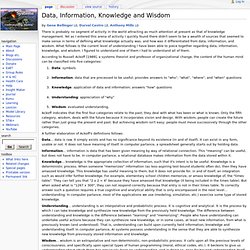
Data, Information, Knowledge, & Wisdom. By Gene Bellinger, Durval Castro, Anthony Mills There is probably no segment of activity in the world attracting as much attention at present as that of knowledge management.
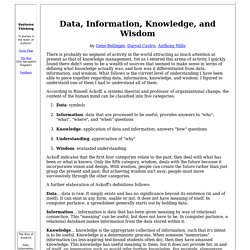
Yet as I entered this arena of activity I quickly found there didn't seem to be a wealth of sources that seemed to make sense in terms of defining what knowledge actually was, and how was it differentiated from data, information, and wisdom. What follows is the current level of understanding I have been able to piece together regarding data, information, knowledge, and wisdom. I figured to understand one of them I had to understand all of them. According to Russell Ackoff, a systems theorist and professor of organizational change, the content of the human mind can be classified into five categories: Ackoff indicates that the first four categories relate to the past; they deal with what has been or what is known. Dikw « relationary.wordpress.com. In an earlier post I created a variation on this ring diagram: I came up with the two lower levels of the ring diagram, reflex and intuition, after having given considerable thought to the Six Hats metaphor: And the Six Rings metaphor: I could see that these hexads revealed two levels that were rarely discussed in the context of Data, Information, Knowledge and Wisdom.
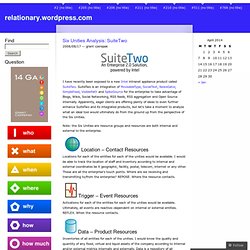
I began to wonder how to correctly define them. Systema: CI-DIKW Hierarchy Definitions « relationary.wordpress.com. I have been wanting to clearly define each of the terms Data, Information, Knowledge and Wisdom for some time.
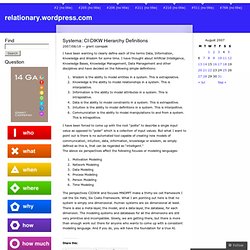
I have thought about Artificial Intelligence, Knowledge Bases, Knowledge Management, Data Management and other disciplines and have decided on the following simple definitions: Wisdom is the ability to model entities in a system. This is extrapolative.Knowledge is the ability to model relationships in a system. This is interpolative.Information is the ability to model attributes in a system. This is intrapolative.Data is the ability to model constraints in a system. I have been forced to come up with the root “polite” to describe a single input value as opposed to “polar” which is a collection of input values.
Motivation ModelingNetwork ModelingData ModelingProcess ModelingPerson ModelingTime Modeling The perspectives CIDIKW and focuses MNDPPT make a thirty-six cell framework I call the Six Hats, Six Coats Framework. Bloom's Taxonomy-Learning in Action. Génie des technologies de l'information. Un article de Wikipédia, l'encyclopédie libre.
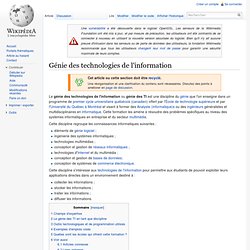
Cette discipline regroupe les connaissances informatiques suivantes : éléments de génie logiciel ;ingénierie des systèmes informatiques ;technologies multimédias ;conception et gestion de réseaux informatiques ;technologies d'Internet et du multimédia ;conception et gestion de bases de données;conception de systèmes de commerce électronique. Cette discipline s'intéresse aux technologies de l'information pour permettre aux étudiants de pouvoir exploiter leurs applications directes dans un environnement destiné à : collecter les informations ;stocker les informations ;traiter les informations ;diffuser les informations.
Champs d'expertise[modifier | modifier le code] Le génie des TI en tant que discipline[modifier | modifier le code] "Science is organized knowledge. Wisdom is organized life" Novice-expert.jpg (Image JPEG, 900x700 pixels) The+Knowledge+Pyramid.jpg (Image JPEG, 501x361 pixels) Crowdthings. Birth of a Meme: The Rise of Culture Tech. I’ve been tracking emerging trends for a while now, exploring the co-evolution of humanity and our technologies, and building visions of the kinds of futures I’d like to see.
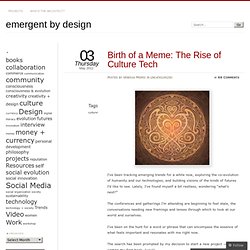
Lately, I’ve found myself a bit restless, wondering “what’s next?” The conferences and gatherings I’m attending are beginning to feel stale, the conversations needing new framings and lenses through which to look at our world and ourselves. I’ve been on the hunt for a word or phrase that can encompass the essence of what feels important and resonates with me right now. The search has been prompted by my decision to start a new project — writing my first book. (yay!) I’ve spent the past few weeks reviewing everything I’ve written so far on the blog, reflecting upon what I’ve observed, what I’ve learned, and identifying the deep values I’ve chosen to serve as a compass and foundation for what is meaningful and significant.
While some will posit that the ‘solution’ is technological (better algorithms! :: Culture :: Neat. Proceedings Template - WORD. A Primer: Enterprise Wisdom Management and the Flow of Understanding ScottCarpenter@CognitiveCybernetics.comCupertino, CA 95014 / (408) 772-2811.
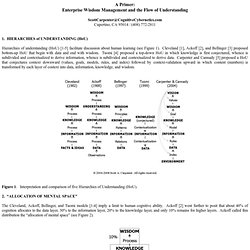
Knowledge Cartography. DIKWchain.pdf (Objet application/pdf) Knowledge to Wisdom. Competences-cognitives-pierre-levy.pdf. Phronesis. Phronēsis ( Greek : φρόνησις) is the Greek word for wisdom or intelligence which is a common topic of discussion in philosophy .
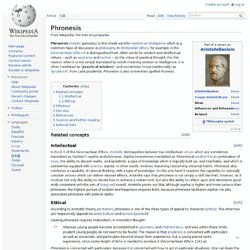
In Aristotelian Ethics , for example in the Nicomachean Ethics it is distinguished from other words for wisdom and intellectual virtues – such as episteme and techne – as the virtue of practical thought. For this reason, when it is not simply translated by words meaning wisdom or intelligence, it is often translated as " practical wisdom ", and sometimes (more traditionally) as " prudence ", from Latin prudentia . Phronesis is also sometimes spelled Fronesis . [ edit ] Related concepts [ edit ] Intellectual In Book 6 of the Nicomachean Ethics , Aristotle distinguishes between two intellectual virtues which are sometimes translated as "wisdom": sophia and phronesis .
Social Value Creation: How To Manufacture Wisdom. We call this wisdom In the old days, the hiring manager was the person to know if you wanted to get a job.

They would read your resume and compare it with the “bell curve” in their mind. This bell curve contains a statistical sample of all similar situations that the manager has witnessed, the variables involved, and a range of outcomes observed across their long and illustrious career…Ohhhmmmmmm We Call This Simulated Wisdom Modern HR systems try to simulate this wisdom through a series of innovations such as key word search, structured interviews, personality tests, and employee incentives. Social Media vs. Harness Collective Wisdom. DataInfoKnow.jpg (Image JPEG, 693x583 pixels) Journal of Knowledge Management Practice, Understanding Data, Information, Knowledge And Their Inter-Relationships Anthony Liew, Knowledge, Information, and Data are key words and also fundamental concepts in knowledge management, intellectual capital, and organizational learning.
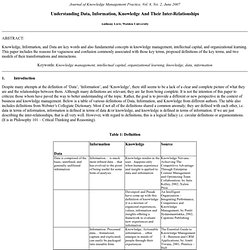
This paper includes the reasons for vagueness and confusion commonly associated with those key terms, proposed definitions of the key terms, and two models of their transformations and interactions. Collective wisdom. Collective wisdom, also called group wisdom and co-intelligence, is shared knowledge arrived at by individuals and groups. Collective intelligence, which is sometimes used synonymously with collective wisdom, is more of a shared decision process than collective wisdom. Unlike collective wisdom, collective intelligence is not uniquely human, and has been associated with animal and plant life. Collective intelligence is basically consensus-driven decision making, whereas collective wisdom is not necessarily focused on the decision process. Collective wisdom is a more amorphous phenomenon which can be characterized by collective learning over time.
History[edit] From smart to wise. Information literacy. The United States National Forum on Information Literacy defines information literacy as " ... the ability to know when there is a need for information, to be able to identify, locate, evaluate, and effectively use that information for the issue or problem at hand. "[1][2] Other definitions incorporate aspects of "skepticism, judgement, free thinking, questioning, and understanding... A number of efforts have been made to better define the concept and its relationship to other skills and forms of literacy. School of Wisdom - Established by Hermann Keyserling in 1920. The origin of DIKW Hierarchy. The Origin of the Data Information Knowledge Wisdom Hierarchy By Nikhil Sharma [Updated: ]
Information du futur: trouver la réalité dans le code. Wired West vol. 5 no. 4 - Competitive Intelligence: What to Do with the Data. Roger Hough, Lowell Professional Services Introduction This article is a summary of a presentation given to a joint meeting of the Special Libraries' Association and the Society of Competitive Intelligence Professionals (SCIP) in Calgary on 16th May 2002. Competitive intelligence increasingly requires access to and the processing of large quantities of data. Various analytical techniques are available to help create actionable intelligence.
This article reviews some of the available techniques. What is Competitive Intelligence? The Society of Competitive Intelligence Professionals (SCIP) defines CI as "a systematic and ethical programme for gathering and analysing information about your competitors' activities and general business trends to further your own company's goals". WandoraWiki. This page collects Wandora's documentation. The documentation is a work in progress and incomplete.
Also note some documentation may be out of date as the application is developed actively. If you need any specific help, write your question to the discussion forum. Wandora's YouTube channel has several tutorial videos reviewing some application features. Would you like to edit this wiki, send an email to support.
DIKW. The DIKW Pyramid, also known variously as the "DIKW Hierarchy", "Wisdom Hierarchy", the "Knowledge Hierarchy", the "Information Hierarchy", and the "Knowledge Pyramid",[1] refers loosely to a class of models[2] for representing purported structural and/or functional relationships between data, information, knowledge, and wisdom. "Typically information is defined in terms of data, knowledge in terms of information, and wisdom in terms of knowledge".[1] History[edit] "The presentation of the relationships among data, information, knowledge, and sometimes wisdom in a hierarchical arrangement has been part of the language of information science for many years. Although it is uncertain when and by whom those relationships were first presented, the ubiquity of the notion of a hierarchy is embedded in the use of the acronym DIKW as a shorthand representation for the data-to-information-to-knowledge-to-wisdom transformation.
Dussin and Ferro, "The Role of the DIKW Hierarchy in the Design of a Digital Library System for the Scientific Data of Large-Scale Evaluation Campaigns", TCDL Bulletin 5.1 (2009) The Role of the DIKW Hierarchy in the Design of a Digital Library System for the Scientific Data of Large-Scale Evaluation Campaigns. Manage Your Data: Data Management: Subject Guides. The MIT Libraries supports the MIT community in the management and curation of research data by providing the following services: DIKW : Define, Explore, Discuss. 1. The DIKW Model of Innovation. Data simply exists. It gains context to become. Community of practice and trust building - ... a beginner at something. How to get from words to trust - ... a beginner at something. Virtuallythere - Cognitive Domain dikw. We have already made a distinction between learning as a process and learning as a product or learning understood in terms of the outcome the learning process.
In this section we are concerned with learning as a product. More specifically, we're concerned with the various components of the cognitive domain. Cognition in its broadest sense refers to the process of knowing and to the product of such a process;. This means that cognition is not just to do with knowing or with having knowledge. Cognition also involves what have been considered to be higher order cognitive skills such as understanding or evaluating. 2.1 Do We Really Want to Produce Wise Students? The inclusion of wisdom in the process of learning might strike some educators as a little odd, but as Bruner pointed out in "The Process of Education", education is about more than learning. 6.1 Reasons for Revising the Taxonomy 6.2 The Knowledge Domain Knowledge is not represented in the revised framework.